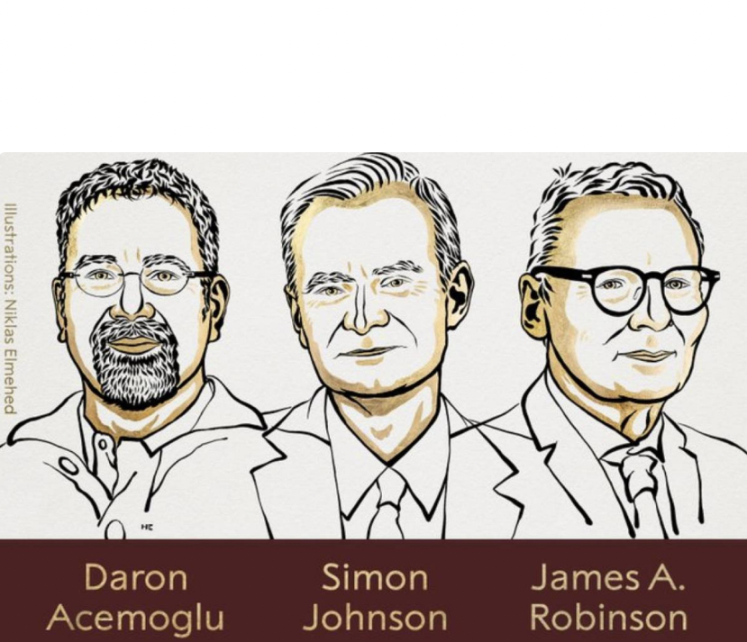The recent Nobel Prize in Economics (awarded to Daron Acemoglu, Simon Johnson and James Robinson) is both a celebration and a call to action for those invested in addressing global inequalities. As an institute dedicated to understanding and solving global challenges through innovation, economic research and policy analysis, UNU-MERIT applauds this recognition of research that critically examines the origins and impacts of inequality across nations. This award underscores the essential role that interdisciplinary research plays in addressing systemic issues, and resonates deeply with the mission of the United Nations University.
At UNU-MERIT, our work fundamentally aligns with the themes Acemoglu, Johnson and Robinson addressed. Their research blends economic theory with empirical evidence, showcasing how structural, historical, and political factors contribute to enduring inequalities. This resonates with our institute's approach of integrating diverse fields—from economics and political science to innovation studies and technology assessment—in our pursuit of solutions for sustainable development. Like these Nobel laureates, we believe in investigating economic phenomena and the political and institutional structures that reinforce disparities, often against a backdrop of social and technological transformations.
Moreover, the issues highlighted by this year’s Nobel Prize are especially relevant given today’s "polycrisis"—a convergence of crises that compound each other, from climate change and economic instability to migration and social inequality. UNU-MERIT views these layered challenges as interconnected, requiring responses that are both globally oriented and locally adaptable. This is why we are committed to advancing research that not only furthers academic knowledge but also contributes actionable insights for policy and practice in contexts of inequality, instability, and resource scarcity.
Prof. Dr. Clemens Kool, UNU-MERIT's Interim Director (and chair of Macroeconomics and International Monetary Economics at the School of Business and Economics of Maastricht University) shared his thoughts: “The work of this year’s three Nobel Prize winners in economics is a shining example of the value that social science in general and economics in particular can contribute: their prize-winning research addresses cross country inequality, one of the most important and urgent global challenges in a multidisciplinary way with the use of both theoretical and empirical analysis. At the same time, it makes significant contributions to the academic state-of-the-art and provides clear insights for welfare-enhancing policies. Clearly, it is the type of work we also aim to do at UNU-MERIT. I hope and trust their work and this prize will serve as a stimulus and motivation for all of us.”
Yannick Markhof, PhD fellow at UNU-MERIT (and team member at the Living Standards Measurement unit of the World Bank) further reflected: “It has been over 20 years since this year's laureates published the milestone papers they are now recognized for. Today, entire generations of development economists, including myself, grew up - from undergraduate to (post-)PhD and beyond - debating their work in and outside the classroom and drafting new research ideas based on the work of Acemoglu, Johnson and Robinson. This is not only a testament to the importance of the academic debate they have been stimulating, but it is also a service to science itself: hundreds of papers and research projects have followed in their wake (and many more still will) and I would be hard-pressed to name a set of economists that have been more influential in the scientific debate on the macro-drivers of development over the last decades. Whether one ultimately agrees or disagrees with the message Acemoglu, Johnson and Robinson put forward, their impact on the field of development economics is evident, enduring, and deservingly so recognized with a Nobel Prize this year."
Another of our PhD fellows, Stefanie Roost, wrote a short op-ed with her reflections around this topic for Maastricht University's website.
The recognition of Acemoglu, Johnson and Robinson’s work by the Nobel Committee speaks to the urgency and significance of research focused on reducing inequalities—work that is at the heart of UNU-MERIT's mission. At a time when crises converge, leading to multifaceted challenges, UNU-MERIT remains steadfast in its commitment to produce research that not only illuminates the causes of inequality but also offers pathways to more equitable and resilient societies.
As we celebrate the achievements of these Nobel laureates, we also see their success as an inspiration to continue bridging the gap between research and real-world impact. UNU-MERIT will remain focused on fostering knowledge that informs policy, drives innovation, and supports sustainable development. We look forward to contributing to this essential field of study and to continue producing research that not only advances academic understanding but also helps create a fairer, more sustainable world.


